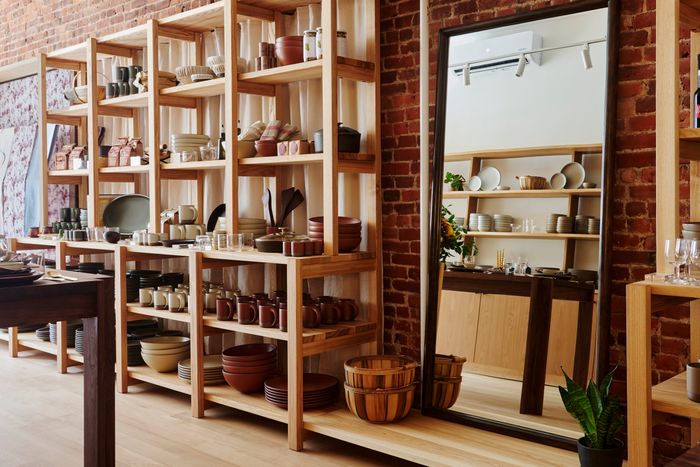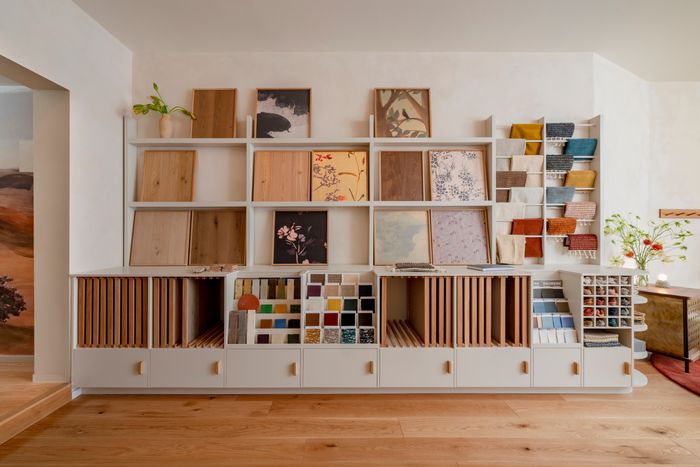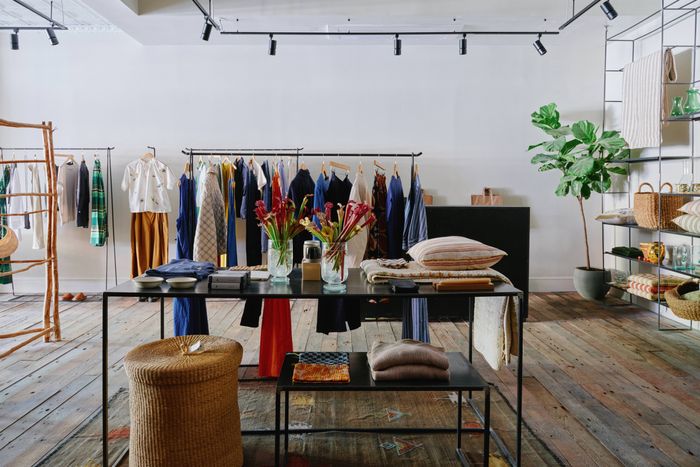This Stretch of Atlantic Avenue Can’t Fit Another Tasteful Shop
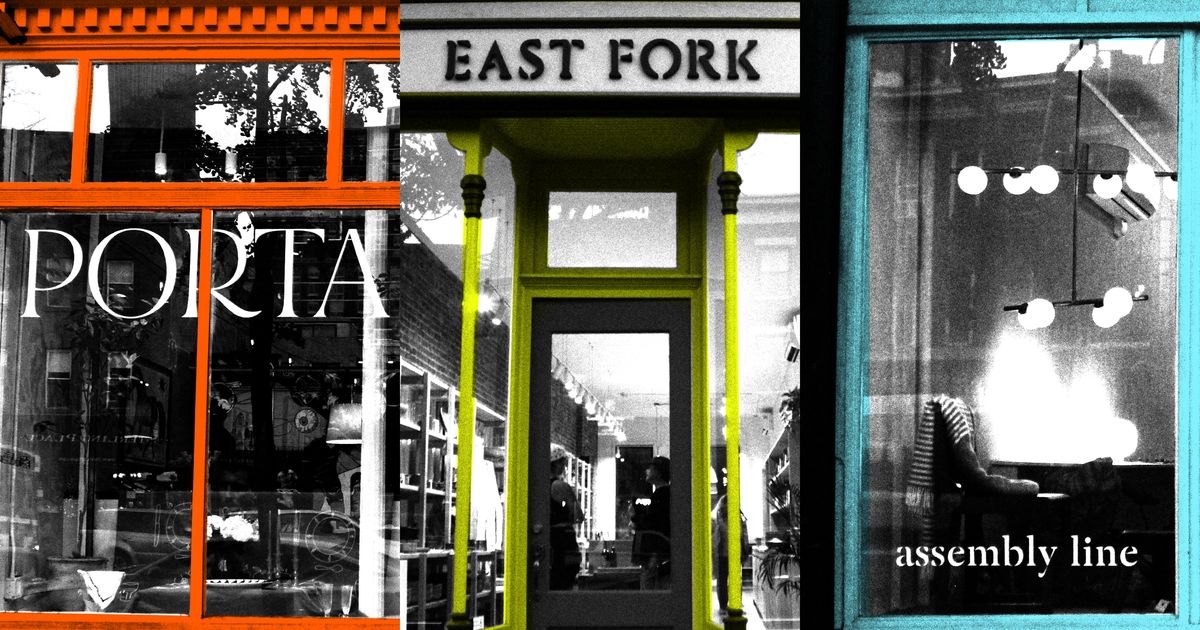
Photo-Illustration: Curbed
Last month, food-industry favorite East Fork opened its doors on Atlantic Avenue in Brooklyn. It’s the North Carolina–based pottery company’s first retail location outside of the South, after running pop-ups in Soho and Williamsburg. In fact, East Fork founder Alex Matisse had first considered Soho for the store as well — an option he admitted would have been more of “an ego-driven decision” — but decided on the Atlantic Avenue location after mapping the brand’s New York customer base and discovering that the street was smack in the middle of it.
The pottery brand joins a particularly dense lineup of homeware and clothing shops, including eight other stores that have opened on the block in the past few years. Here, on the stretch between Bond and Hoyt, someone shopping for home décor might even get a little overwhelmed — you can drop into Porta for a hand-painted pasta bowl from Italy; grab an indigo rug sample at Assembly Line, a newcomer run by interior designers Sarah Zames and Colin Stief; and browse the blown-glass vases at the first American outpost of Toast, the fashion and homewares brand from England. And then there’s the Primary Essentials, Mud Australia, Layla, and nearly a half dozen more shops filled with beautiful, one-of-a-kind things.
The East Fork store on Atlantic is the shop’s first outside of the South and carries its pottery along with other tableware.
Photo: Matthew Gordon
It’s not surprising that so much has converged on this single block. While it’s located in Boerum Hill, it’s a nexus for the neighborhoods of brownstone Brooklyn, including Park Slope, Fort Greene, Cobble Hill, Carroll Gardens, and Brooklyn Heights, and a short walk for the luxury-tower residents of Downtown Brooklyn. The avenue, especially near the waterfront, has been a shopping destination since the late 1800s, but the block between Hoyt and Bond in particular became known as “antiques row” during the Brooklyn brownstone revival of the 1960s and ’70s. There’s just one holdout from that era now, Horseman Antiques, with its wares spilling onto the sidewalk. A ’90s and mid-aughts influx of well-curated, stylish shops like Steven Alan, consignment boutique Butter, and Jonathan Adler followed, partly mapped out by this magazine. In the 2010s, yet more independent stores opened, like Collier West, a home-décor shop from Ohio; M.Patmos; and Jao Social Club, an apothecary with home goods. Shop owners like Margaret Austin, who grew up in Brooklyn Heights and opened Outline on the block with Hannah Rieke a couple of years ago, knew it well. “I remember as a kid walking over here when I was 10 years old with my sister and going to the Butter sample sale,” she says, referring to the shop that Eva Dayton ran prior to opening Consignment Brooklyn. “This has always been an amazing block for retail, and we wanted to be part of that.”
Now, with the recent opening of her shop, along with Porta, Three 80 Atlantic, the Consistency Project, and Misha and Puff, among others, the block has become, almost by accident, an absurdly tasteful Main Street. Or, as Emilia Petrarca, a fashion writer who helms the newsletter Shop Rat, says, it’s “a nice modern reflection of what Brooklyn is and what women who live in Brooklyn want.” She adds, “I think that they have stuff that you really, truly cannot find elsewhere, even in Manhattan. It’s down-to-earth, it has a sense of humor, it feels very handmade. It’s not so sleek and polished as maybe what you might find in Manhattan, but it’s also not as quirky as what I think you would maybe find in like a quote-unquote Brooklyn store like ten years ago.” Hilary Reid, a Strategist editor who lived in the area until recently, points out, “It feels like a place that you go if you want that look of things you’ve collected from all over the place.” Petrarca compares it to the Lower East Side, saying it’s similar in terms of how unintimidating the shops are, but with one key difference: “It’s more adult,” she explains. “It’s for your third apartment, not your second.” And for those who are trying not to spend much, it’s simply an excellent destination for window-shopping, which Reid often did when she lived in the area. Erika Owen, a writer and editor based in Clinton Hill, is a regular for exactly this reason. “I have a few happy places around the city where I love to spend slow, work-free afternoons, and this is definitely one of them,” she says.
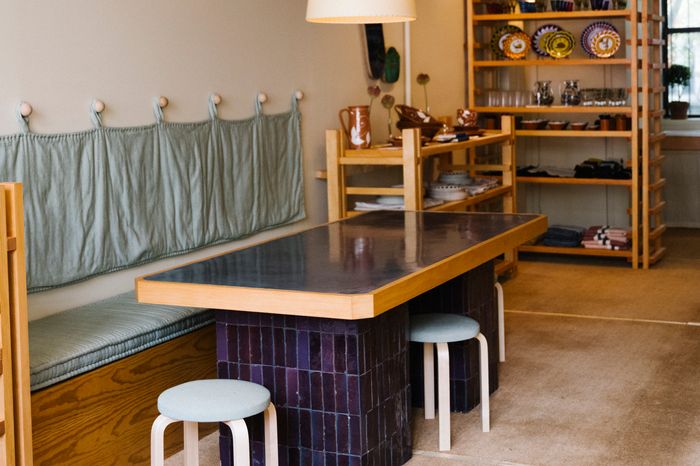
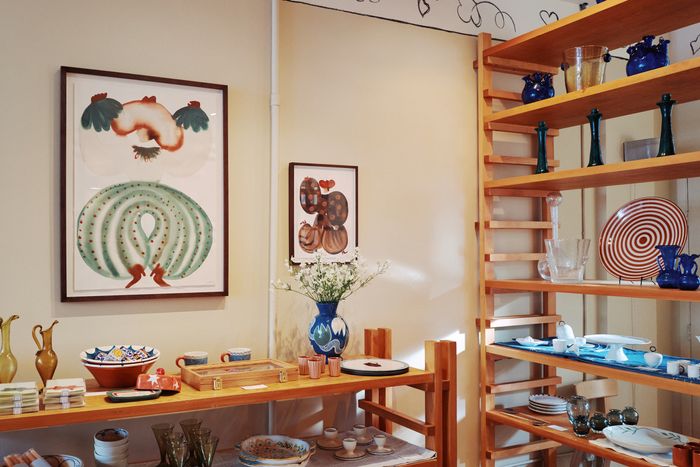
From left: In a space designed by Studio Giancarlo Valle, Porta sells handblown glasses, hand-painted bowls, and other carefully crafted tableware sourced in Europe. Photo: Adrianna GlavianoPhoto: Kate Owen
From top: In a space designed by Studio Giancarlo Valle, Porta sells handblown glasses, hand-painted bowls, and other carefully crafted tableware sour…
From top: In a space designed by Studio Giancarlo Valle, Porta sells handblown glasses, hand-painted bowls, and other carefully crafted tableware sourced in Europe. Photo: Adrianna GlavianoPhoto: Kate Owen
At Assembly Line, customers can look at wallpaper and tile samples in addition to furniture, light fixtures, and tabletop accessories.
Photo: Sean Davidson
It also helps that other design-focused shops and venues are nearby, like Maison Kitsuné’s Café Kitsuné and the Ace Hotel in Downtown Brooklyn, which regularly hosts design programs and displays contemporary textile art in its guest rooms. Stief, one of the owners at Assembly Line, says, “I think that was a big sign that there was going to be a lot of people who are interested in design.”
Besides the location itself, some shop owners say their landlords made it easy to move there — and stick around. East Fork’s landlord gave the company the right of first refusal in its lease, meaning that in the event that he wanted to sell the building during East Fork’s tenancy, he would first offer it to the company. Renda Mansour, Toast’s head of retail expansion, says that its landlord shared trusted contractors, architects, and other contacts to help fit out the store, which she especially appreciated since all of the brand’s contacts are located in the U.K. And when the pandemic lockdown made in-person shopping untenable, Lauren Snyder, the founder of the Primary Essentials, says her landlord allowed her to pay 50 percent of the rent in the early months of the lockdown and never required her to pay it back. Snyder, who’s been in the same space for 11 years, says, “If I didn’t have him, I honestly don’t think that I would still have the store. He’s been fair the whole time.”
As for weathering what looks like a crowded market, the newer shop owners say they’ve gotten a lot of support from the veterans on the block. Outline and Porta’s founders both mentioned that Consignment Brooklyn owner Dayton has been particularly helpful. “Her deep understanding of the area’s evolution and community was very generous,” says Alice Russotti, who owns Porta with Francesca del Balzo. Some of the owners keep in touch in a shared group chat, while others simply check in on their neighbors in person — easy to do when most of the owners are working in the stores too, Austin says.
This also lends itself to a shopping experience that still feels surprising from store to store. Before opening the East Fork store, the company’s buying team edited the selection so that there was no overlap between their store and others on the block. Outline’s owners did the same. As Austin said, “This block is already so rich with amazing stores for homewares that we tread lightly and try to find things that are super-novelty.” A smart business decision, yes, but also a conscious choice to not cannibalize someone else’s customers. “Change is hard,” says Matisse, the founder of East Fork. “I hope that we’re a good part of that change and can be a good neighbor. It has felt like we’re a good fit.”
The display of clothing and home goods at Toast.
Photo: Alice Gao/TOAST/
Related
Exclusive | Dave Portnoy is quietly shopping a book
Barstool Sports founder Dave Portnoy is shopping a book, Page Six has exclusively learned. Portnoy’s agency UTA is repping the tome, sources te
We Track Sales For A Living. Here Are The 30…
As shopping experts, we shop slowly and carefully to discern if a sale offers the most bang for our buck. From everyday essentials to larger splurges, knowing w
Can you afford to be patriotic when grocery shopping?
CBCPenguins bask on the shore of King George Island near Brazil's Comandante Ferraz research station in Antarctica.Antarctica is like no place on Earth. The "W
Our Readers Top Loved Products Last Month Were All Sleep…
1TOP-TESTED COTTON SHEETSCalifornia Design Den Cotton SheetsNow 23% OffCredit: California Design DenWhy we love it: If you have been reading our What's In My Ca
